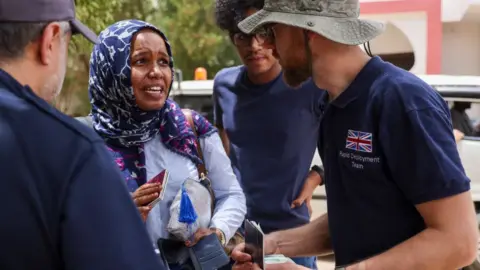Sudan: Are there 'safe and legal' routes to come to the UK?
 MOD
MODHundreds of British nationals have been evacuated from the fighting in Sudan.
But when she was asked whether the UK was going to "start looking at safe routes for refugees from Sudan [who are not British nationals]", Home Secretary Suella Braverman replied: "We have no plans to do that."
The prime minister confirmed the government's current priority was getting British nationals out.
Immigration Minister Robert Jenrick was later asked in Parliament what "safe and legal" routes to the UK would be available to a young person wanting to flee the conflict in Sudan.
He said: "The United Nations is operating in most, if not all, of the countries surrounding Sudan," adding that "the best advice clearly would be for individuals to present to the UNHCR. We already operate safe and legal routes with them."
The UNHCR is the UN's refugee agency.
But the SNP's Alison Thewliss pointed out that the UNHCR had earlier issued a statement saying: "There is no mechanism through which refugees can approach UNHCR with the intention of seeking asylum in the UK."
Mr Jenrick rejected her comments: "Whatever the honourable lady may be quoting from her iPhone, I would prefer to take at face value what I have heard in discussion with the assistant commissioner [of the UNHCR]."
'Lifesaving mechanism'
Mr Jenrick and Ms Thewliss were both referring to the UNHCR's resettlement scheme.
Under this, the UNHCR identifies refugees who are considered to be "particularly at risk" in the countries to which they have initially fled.
These are people who cannot integrate in the country where they have initially sought refuge but also cannot return home.
These "refugees at heightened risk" are then resettled in partner countries such as the UK, but it is UNHCR officials who recommend where they should go.
That route is only available to about 1% of refugees worldwide.
"Although a critical and lifesaving mechanism, resettlement is not a solution for most refugees, and does not replace the right to seek asylum itself," the UNHCR said.
Seeking asylum generally involves going to a country and claiming asylum once you are there.
Resettlement involves moving people from the first country where they sought refuge to another country that is more suitable.
Refugees generally have to be registered with the UNHCR to be considered for resettlement.
But the UNHCR told the BBC that the UK is only currently accepting Afghan nationals for resettlement. This means that registering with the UNHCR would not provide a route for anyone else to come to the UK.
So Mr Jenrick's suggestion that people in Sudan wanting to escape to the UK should "present to the UNHCR" was not correct.
We asked the Home Office about the UNHCR statement and the government's current position on safe and legal routes from Sudan.
We were pointed towards the comment from Ms Braverman quoted above, and told there was no further comment at this point.
According to UK statistics, last year 218 people from Sudan came to the UK under the UNHCR resettlement scheme, but almost all of those came from pre-pandemic applications.



